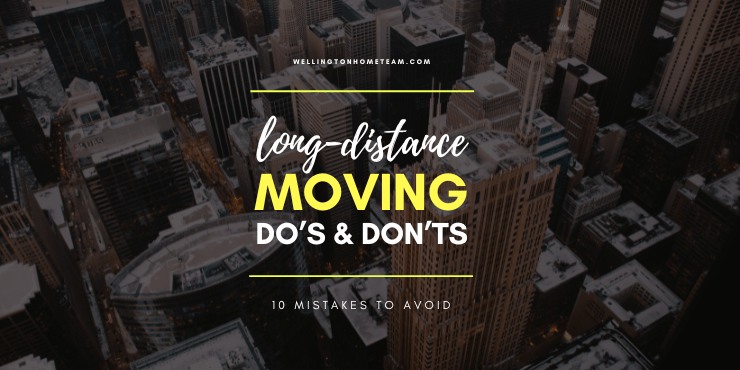Long-Distance Moving Dos and Don’ts: 10 Mistakes to Avoid
Relocating to a new place can be challenging, particularly if it’s far away. However, you may steer clear of a lot of the typical dangers connected with long-distance transfers by carefully preparing and paying attention to detail. We’ll go over some crucial dos and don’ts in this article to make sure the relocation goes as smoothly as possible and to assist you navigate the process effectively. Let’s jump into the dos and don’ts of long-distance moving:

Dos: Planning Your Way to a Stress-Free Move
- Embrace the Early Bird: Catching the “early bird” bargain with moving companies is a good thing. It is best to begin planning 8–12 weeks before your relocation. This allows you plenty of time to get ready, get bids, and prevent rushing at the last minute.
- Do Your Research and Compare Moving Companies: Don’t make this choice right away. Find trustworthy long distance movers in your area, get quotes, and then compare costs and services. Don’t be afraid to ask about their license, insurance, and how much experience they have with long-distance moves.
- Create a Reasonable Moving Budget: Moving can cost a lot of money, and avoiding that fact is a surefire way to get stressed out. Make a thorough budget that includes everything, from the cost of movers and packing supplies to the cost of travel, possible temporary housing, and even fees you might not expect, like long-haul fees or fuel surcharges.
- Declutter and Downsize Like a Pro: It’s not just about making a simple haven; it also saves money! It costs less to move around. Enjoy the process of getting rid of stuff. Get rid of those clothes you haven’t worn, tools you haven’t used, and that collection of porcelain cats (unless it has a lot of sentimental value). To get money for your move, you could sell things you don’t want online or at resale shops.
- Make a Thorough Inventory List: Get in touch with your inner library and make a full inventory list of everything you’re moving. You’ll use this detailed list as your “packing bible.” It helps with insurance claims if anything gets damaged or lost during transport, keeps things from getting lost during the move, and helps you remember things when you’re unpacking in your new home.
- Gather Important Documents: Passports, medical records, insurance paperwork, birth certificates, and social security cards – these are the things you need for moving. Don’t let them get lost in the mix. Get these papers together and put them in a folder or safe box so they are easy to find.
- Arrange Utility Transfers Effortlessly: You don’t want to come home to a dark and cold cave. Plan to move your services from your old home to your new home a long time in advance. Get in touch with your trash, gas, power, water, and internet service providers to make sure the move goes smoothly.
- Research Your New Destination: Whether you’re moving across town or across the country, a little reading will help you a lot. Learn about your new area, including any changes that might happen to the cost of living, the rules and regulations, the school districts (if there are any), and even any hidden gems that are just ready to be discovered. You can feel more ready for your new adventure and make the change easier if you know what to expect.
Don’ts: The Roadblocks to Relocation Bliss
- Procrastination: A lot of people pack at the last minute, so don’t let that happen. Don’t let the expected meltdown before the move happen. Spread out the work and pack a little each day.
- Surprising costs: Moving estimates can help you get started, but costs that you didn’t plan can come up. Set aside some money in your budget in case you need to buy packing supplies or hire extra help on moving day.
- Moving Without Knowing Your Movers: Don’t take the first moving company price you get; it’s like shopping around for car insurance. It is important to get quotes from several reliable businesses to make sure you get the best price and service for your needs.
 Packing Like a Tetris Newbie: Poor packing is a sure way to trouble (and broken things). Label clearly, use good boxes, spread the weight out evenly, and remember that fragile things need extra care.
Packing Like a Tetris Newbie: Poor packing is a sure way to trouble (and broken things). Label clearly, use good boxes, spread the weight out evenly, and remember that fragile things need extra care.- “Oh crap, I forgot!” Moment: Make sure you have a “essentials” bag ready for your first night and day in your new home. To avoid having to quickly run to the store, pack things like toiletries, medicines, a change of clothes, and some nice things to have around.
- Don’t Overpack Boxes: It may be tempting to put as much as possible in each box, but doing so can damage things and hurt people. Make sure the boxes aren’t too heavy to handle and don’t overfill them to keep them from getting damaged during shipping.
- Not Taking Care of Your Things: Accidents happen when you’re moving. Getting moving insurance will protect your things. It might seem like an extra cost, but knowing that you’ll get your money back for any lost or damaged things gives you peace of mind.
- Medical Records Stuck in Transit Hell: Make sure the change in your healthcare goes smoothly by making plans for your medical information to be sent to your new doctors or clinics. This keeps people from having to wait to get important medical information.
- The Blues for Snail Mail: Sorry, moving doesn’t get rid of your bills. If you want to avoid problems and late fees, make sure that your bank accounts, subscriptions, and other important services have up-to-date sending addresses.
- Not Doing Final Walkthrough: Before you leave your old home, you should do a final walkthrough to look for any damage or things you forgot to check. This will give you a chance to fix any problems before giving the keys to the new owners, making sure the move goes smoothly.
Moving FAQs:
Q: How long in advance should I start making plans for a long-distance move?
A: If you’re moving across long distances, you should start making plans at least 8 to 12 weeks before the move. This gives you time to look into moving companies, pack your things, and make any other necessary plans.
Q: How do I pick the best long-distance moving company?
A: It’s important to look into several long-distance moving companies, read reviews, and get quotes from a number of them before making a decision. Check to see if the company is registered, insured, and has a good name for dependability and customer service.
Q: What things shouldn’t I bring with me when I move somewhere far away?
A: Dangerous materials, perishable foods, and valuables like gold and important papers are some things that can’t or shouldn’t be moved long distances. You should ask your moving company for a list of things that they won’t move, and if they don’t have one, you should find another way to carry them.
Q: What can I do to keep my things safe during long-distance moving?
A: To keep your things safe during a long-distance move, use strong packing supplies like bubble wrap and packing paper and make sure your things are in boxes that are the right size. Make sure the boxes are clearly marked, and if you want extra protection against loss or damage, think about getting moving insurance.
Q: What should I do if I need short-term storage while moving across the country?
A: You might want to rent a storage space from a reputable storage facility if you need short-term storage while you move across the country. Make sure the building offers safe, climate-controlled storage options, and find out how people can get in and how their insurance covers things.
Q: How can I move across the country for the least amount of money?
A: You can cut down on the cost of a long-distance move by getting rid of things you don’t need before you pack. You can also save money by getting quotes from more than one moving company, packing and disassembling your own things if you can, and picking a moving date that isn’t during the busiest time of the year.
Final Thoughts
By following these long-distance moving dos and don’ts, you can avoid many of the mistakes that people make when they move long distances and make sure the move goes smoothly. To keep things as stress-free and easy as possible during the move, remember to start early, do research on your moving business, and make a list of all your things. You can make your long-distance move a good one for you and your family if you plan ahead and pay attention to the little things.
Please consider spreading the word and sharing; Long-Distance Moving Dos and Don’ts: 10 Mistakes to Avoid
Check out these essential dos and don'ts of long-distance moving to ensure a successful and stress-free relocation. Expert advice and tips inside for long-distance moving! #realestate #movingAbout the Author
Top Wellington Realtor, Michelle Gibson, wrote: “Long-Distance Moving Dos and Don’ts: 10 Mistakes to Avoid”
Michelle has been specializing in residential real estate since 2001 throughout Wellington Florida and the surrounding area. Whether you’re looking to buy, sell or rent she will guide you through the entire real estate transaction. If you’re ready to put Michelle’s knowledge and expertise to work for you call or e-mail her today.
Areas of service include Wellington, Lake Worth, Royal Palm Beach, Boynton Beach, West Palm Beach, Loxahatchee, Greenacres, and more.

 Michelle Gibson of the Hansen Real Estate Group Inc is a full-time REALTOR who has been specializing in Wellington, Florida real estate since 2001. This veteran of the real estate industry has expertise in technology, marketing, and social media.
Michelle Gibson of the Hansen Real Estate Group Inc is a full-time REALTOR who has been specializing in Wellington, Florida real estate since 2001. This veteran of the real estate industry has expertise in technology, marketing, and social media.